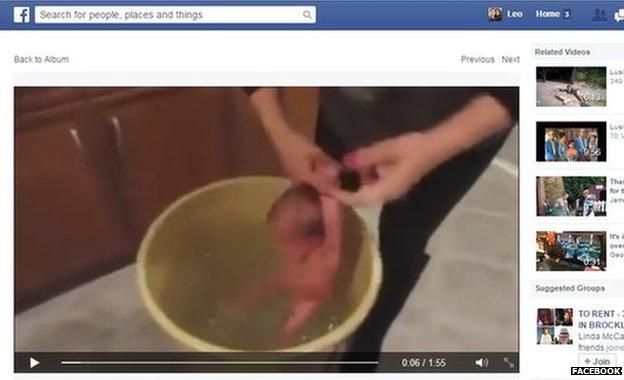Facebook criticised by NSPCC over baby dunking video clip
- Published
- comments

A leading child protection charity has demanded Facebook and other social networks be held to account following a clash over a "disturbing" video.
The NSPCC says the video shows a "terrified, sobbing baby" being dunked repeatedly in a bucket of water and wants the UK government to intervene.
It is not clear when or where the video was made or what the context was.
Facebook says it does not believe the video breaches its rules and says it will not ban all uses of the footage.
'Serious damage'
The video - running to nearly two minutes in length - shows the baby being twisted by her arms and held upside down by her legs as she is picked up and partly submerged in the water dozens of times.
She cries at first but stops after the carer changes the way she is being held. A still from the video is shown further down this story.
Claire Lilley, who leads Child Safety Online for the NSPCC, told the Today programme the baby was being flung about in a manner which could cause "serious damage" to her limbs.
Following some reports which claim the video is an example of "baby yoga", Ms Lilley said: "What is one person's baby yoga in one person's context is child abuse in another person's context."
She added the film was "one example of content which is freely available to see".

Facebook added a warning sign to the video after the NSPCC's complaint was escalated
The charity wants the government to create a new organisation "armed with the legal powers to ensure internet companies are transparent and accountable".
Its letter urges culture minister Ed Vaizey and internet safety minister Joanna Shields to look at "all available options" to make sure people in the UK are "no longer exposed to this kind of dreadful and disturbing content".
Facebook acknowledged that the video was "upsetting and disturbing", but said its users should still be able to watch it.
It said it was removing the video in cases where it received reports that the behaviour in it was being encouraged or supported.
It added it was allowing the video to be used when people were raising awareness or condemning the actions within it. However, in those cases it would mark the video as disturbing, which means they have a warning screen and are accessible only to people over the age of 18.
Since the video has been shared by more than one person, Facebook said it could not confirm how many people had viewed it in total. However, it confirmed that in one of the clips flagged to them, the video had received more than 200 views.
Facebook's UK policy director Simon Milner told BBC Radio 4's Today programme that in other cases, by drawing attention to a distressing situation, the website had "seen from experience that it can and does lead to the rescue of the child".
He added: "We've been in contact with the authorities... [and] hope they'll be able to track down this child."

Analysis

By Leo Kelion
The carer's face is out of frame and she appears to be speaking in an Asian language but the tone of her voice suggests that this is someone playing with the child rather than an angry adult setting out to punish the infant, however misguided her actions may be.
Some, but not all, of the comments below the version of the video that I saw were in Indonesian. However, the clip has since become "unavailable" - perhaps because the woman who posted it has deleted it.
The quality of the video is low definition - it is hard to make out any of the baby's features - which could suggest it was filmed some time ago or perhaps on a budget-priced phone.
Facebook has acknowledged that more than one copy of the video has been shared on its site, and that it only adds warning messages after being alerted to an instance by its users. It is therefore unknown at this stage how many times the clip has been watched.

Community guidelines
Although the social network now shows a warning message - known as an interstitial - at the start of the video, it was not added when the clip was initially reviewed, and the BBC had asked why one was not present.
Facebook first introduced interstitials at the end of last year, after coming under pressure to do so by one of its own safety advisers.
The Family Online Safety Institute (Fosi), had raised concerns that disturbing videos were spreading via the site and auto-playing in users' feeds without warning.
Fosi is still pressing for Facebook to let users add interstitials themselves.
Prime Minister David Cameron previously criticised the social network after it refused to remove another clip, which showed a woman being decapitated.
The US-based site, which permits anyone aged 13 and above to be a member, later issued new community guidelines, external explaining that it wanted people to be able to raise awareness of controversial topics.
A spokeswoman for the government confirmed it had received the NSPCC's letter and said it would be responded to in due course.
- Published16 March 2015

- Published13 January 2015

- Published27 August 2014

- Published23 October 2013

- Published22 October 2013

- Published1 May 2013
